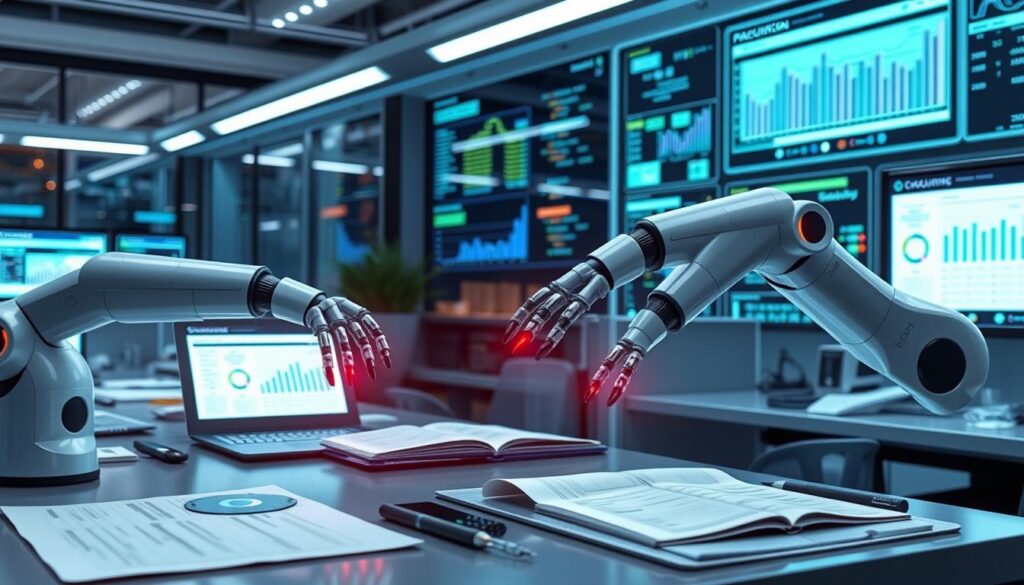As someone who has spent years in the accounting industry, I’ve seen firsthand how Robotic Process Automation (RPA) is revolutionizing the way we handle financial data. If you’re still relying on manual processes for tasks like invoice processing, payroll, and reconciliations, you might be missing out on a game-changing technology that can streamline operations, reduce costs, and improve accuracy.
Let’s dive into how RPA is transforming accounting operations and why it’s something every finance professional should consider.
What is Robotic Process Automation (RPA)?
RPA is a technology that automates repetitive, rule-based tasks by using software robots, also known as “bots.” These bots mimic human interactions with digital systems, such as logging into applications, extracting data, filling out forms, and processing transactions.
Key Benefits of RPA in Accounting:
✔ Efficiency: Automates repetitive tasks, reducing processing time.
✔ Accuracy: Eliminates human errors in data entry and calculations.
✔ Cost Savings: Cuts labor costs by reducing manual work.
✔ Compliance: Ensures regulatory compliance with audit trails.
“RPA allows accountants to focus on strategic decision-making rather than mundane, time-consuming tasks.”
How RPA Transforms Key Accounting Functions
1. Accounts Payable Automation
Handling invoices manually can be a nightmare—errors, delays, and compliance risks. With RPA, invoice processing becomes seamless.
Before RPA:
- Manually entering invoice data.
- Matching invoices to purchase orders.
- Approving invoices through email chains.
After RPA:
✅ Bots extract invoice data and input it into accounting software.
✅ Automated 3-way matching (invoice, PO, and receipt).
✅ Approval workflows triggered automatically.
Impact:
- Processing time reduced by 60-80%.
- Error rates drop significantly.
- Cash flow management improves.
2. Payroll Processing
Payroll involves multiple steps—timesheet validation, tax calculations, direct deposits. A single mistake can result in compliance issues.
✅ With RPA:
- Bots pull timesheet data from different systems.
- Automates tax deductions and benefit calculations.
- Generates payroll reports for audits.
Outcome:
💰 Fewer payroll errors = fewer employee complaints.
⏳ Processing time reduced by up to 90%.
Table: Manual vs. RPA-Enabled Accounting Processes
| Accounting Process | Manual Process | With RPA |
|---|---|---|
| Invoice Processing | Data entry, email approvals | Bots extract data, auto-approve invoices |
| Bank Reconciliation | Manual matching of transactions | Bots match transactions in seconds |
| Payroll Processing | Tax calculations done manually | Automated payroll runs with error checks |
| Financial Reporting | Gathering data from multiple sources | Bots generate reports instantly |
| Compliance Audits | Manually collecting and verifying documents | RPA organizes and retrieves documents in seconds |
3. Bank Reconciliations
Matching transactions manually is time-consuming and prone to human errors. RPA bots can:
✔ Extract transaction data from bank statements.
✔ Compare it against accounting records.
✔ Flag discrepancies for review.
⏳ What used to take hours now takes minutes!
4. Financial Reporting & Compliance
Preparing financial statements, tax reports, and compliance documents can be overwhelming. RPA simplifies these tasks by:
✅ Pulling data from multiple sources automatically.
✅ Generating real-time reports for audits.
✅ Ensuring compliance with tax laws and financial regulations.
“With RPA, financial reports that once took days can now be generated in minutes.”
Key Takeaways
💡 RPA saves time and reduces errors in accounting.
💡 It improves compliance by maintaining accurate audit trails.
💡 Automated processes enhance efficiency and reduce operational costs.
💡 Accountants can focus on strategic financial planning instead of repetitive tasks.
FAQs about RPA in Accounting
Q1. Is RPA expensive to implement?
🔹 Initially, there is a cost for RPA software and setup. However, the long-term savings on labor and error reduction far outweigh the investment.
Q2. Can RPA replace accountants?
🔹 No, RPA doesn’t replace accountants; it enhances their work by handling repetitive tasks, allowing them to focus on higher-value financial analysis and decision-making.
Q3. How long does it take to implement RPA?
🔹 Depending on the complexity, it can take a few weeks to a few months to deploy RPA. Once implemented, the benefits are immediate.
Q4. Is RPA secure for handling financial data?
🔹 Yes! RPA operates within existing security protocols and provides an audit trail, making it more secure than manual processes.
Q5. Can small businesses use RPA, or is it only for large corporations?
🔹 Small businesses can also benefit from RPA, as there are affordable options that scale with business growth.
Conclusion
RPA is transforming accounting operations by automating repetitive tasks, reducing errors, and improving efficiency. Whether it’s invoice processing, payroll, bank reconciliations, or financial reporting, RPA can handle it all.
If you’re looking to streamline your accounting processes, save time, and cut costs, RPA is the way forward. Don’t let outdated manual processes hold your business back—embrace automation and unlock the future of accounting! 🚀

